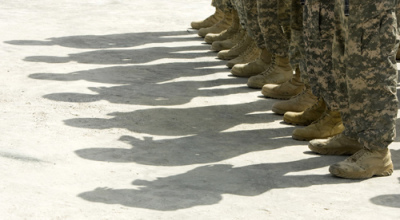Divorce Rate Among Afghanistan, Iraq War Vets Increases by 42 Percent (VIDEO)
The divorce rate among military couples has increased 42 percent throughout the wars in Afghanistan and Iraq, a recent study shows, adding to the woes of U.S. military veterans returning from the Middle East who already have to tackle war-related problems like post-traumatic stress disorder and high unemployment rates.

Couples' plans to pursue divorce gain plausibility with each subsequent month a service member is deployed, according to new research by Family Life, a nonprofit that focuses on marriage and parenting issues. The first 90 days after deployment are the most critical for military marriages, the organization says.
"That window is the proven time frame during which people develop habits and set the tone for the future of their marriage. It's critical for military couples to establish healthy habits quickly as they struggle to reconnect and restructure their families," Family Life Founder and President Dennis Rainey said in a statement.
Some of the most common issues touching fresh veterans are a rushed transition to civilian life, renegotiating roles with the partner, realizing both spouses have changed during deployment, and possibly the influence of post-traumatic stress disorder, the organization claims.
"Civilians often don't understand that, though the battle overseas may be over, our troops must now come home and fight for their marriages," Air Force wife Valerie Gaff of Family Life said. Gaff has experienced the challenges of an 18-year military marriage and now works with the organization to help others in a similar situation.
Gaff’s husband, Air Force Master Sergeant Todd Gaff, received orders to deploy to Afghanistan in 2001. It was to be only the first of 13 duty calls to the Mideast he was to receive.

 Divorce Rate of War Vet Couples Increase
Divorce Rate of War Vet Couples Increase"We had to renegotiate our roles, routines and relationship," Valerie Gaff told Family Life. "While he was away, I was totally in charge and fully responsible for our children and household. When he returned, it was hard to let go of some of those roles. It was also scary getting reacquainted. By necessity, we both changed each time we were apart."
The veterans of Iraq and Afghanistan – who are very often young people – face high unemployment upon returning to the country. The rate of suicides among war vets is also extremely high, experts say.
If long-term distance applies, absence does not make the heart grow fonder, whether in military or civilian relationships, Christian marriage counselor Michael Fox told The Christian Post Monday. He and his wife, Trisha, host a radio show called "Marriage For Today." The couple lives in a military area in Delaware where they have often dealt with military couples, Fox told CP.
"Imagine the intense need of being held, loved and physically cared for but your loved one is not there!” he told CP in a statement. “Sure they're out there fighting for your country, doing what's right, doing their ‘call of duty,’ but still facts are facts and we must address these as they really are, not as we ‘wish’ them to be.”
If a spouse is apart from the other spouse, for any reason or length of time, they experience a feeling of losing the feeling of closeness, Fox said. At first the absence of the loved one makes "the heart grow fonder and deeply misses them," but the increased absence is what becomes a potential “marriage killer” in the process.
"Our need for companionship and the presence of love will not decrease simply because our loved one is either fighting a war, or out on business, or even more closer to our homes, evangelizing souls. Longevity of distance creates an unhealthy demand for needs to be met by anyone!" Fox told CP.
"We knew of a military couple where infidelity happened," he added. "They, through the grace of God and very helpful, positive influence, overcame divorcing but the hot ambers leftover hardly abased. There was always a question of trust and a great need of continual healing. They had expressed the very issue we are discussing. The longevity of distance became too great to continue."
Family Life provides assistance for military couples, including practical advice and free resources.





















